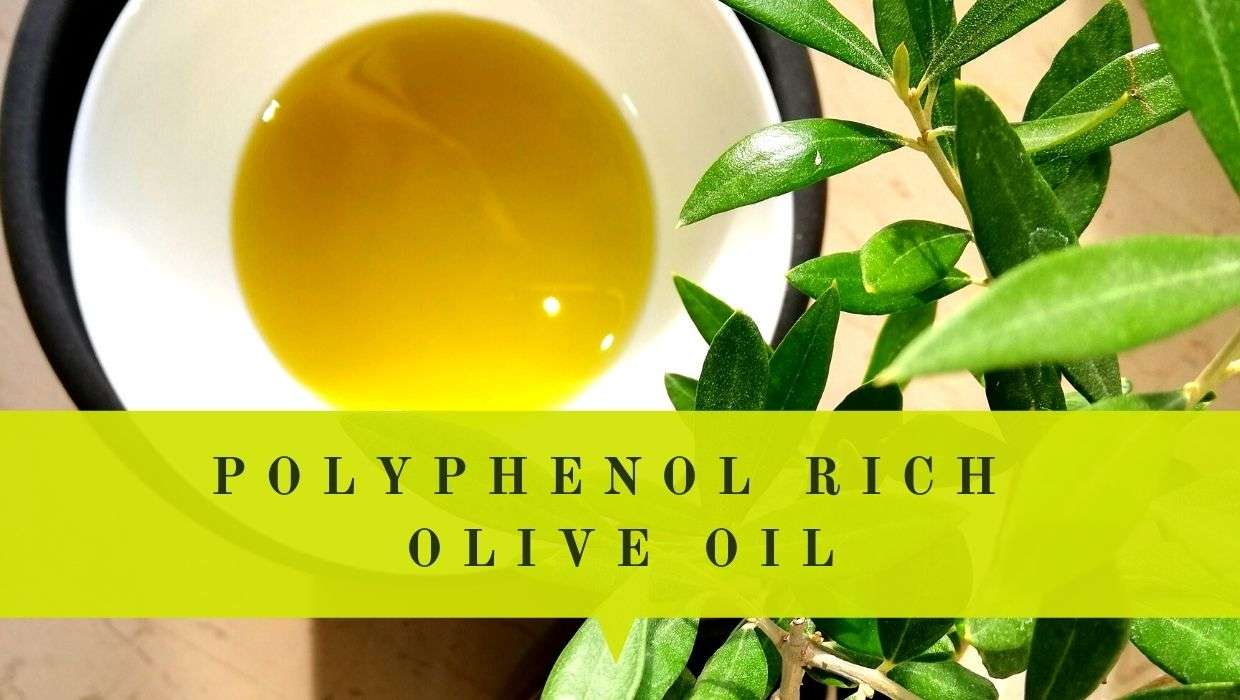This post may contain affiliate links which may generate a small commission from clicks that result in a purchase.
Greek extra virgin olive oil (EVOO) is one of the healthiest edible oils with its balanced flavor, antioxidant properties, and health benefits. Olive oil is the only oil that is extracted from fruit rather than a seed, nut, or grain which keeps a higher portion of natural vitamins and minerals comparing with other oils.
Regular consumption of good quality olive oil may help increase the general welfare and lower your risk for heart disease, high blood pressure, high cholesterol, Type 2 diabetes, obesity, and metabolic syndrome. Greek extra virgin olive oil is one of the healthier options for fats and daily use, as it holds mostly healthy monounsaturated fats and provides the crucial vitamins K and E.
Olive Oil Nutrition Facts and Calories
Olive oil nutritional information per 1 tablespoon of olive oil (14g or 0.5 oz) contains the following:
| Calories | 120 (498 kJ) | 6% of daily value % |
| Total Fat | 14 g | 22% of daily value % |
| Saturated Fat | 2.2 g | |
| Polyunsaturated Fat | 1.8 g | |
| Monounsaturated Fat | 10 g | |
| Trans Fat | 0 g | |
| Total Carbohydrates | 0 g | |
| Dietary Fiber | 0 g | |
| Sugar | 0 g | |
| Cholesterol | 0 g | |
| Sodium | 0 g | |
| Potassium | 0 g | |
| Protein | 0 g | |
| Vitamin E | 1.9 mg | 10% of daily value % |
| Vitamin K | 8.1 mcg | 10% of daily value % |
The nutritional value of olive oil truly exceeds that of any other fat. After several research studies, it is demonstrated that fats are an essential component of nutrition and an integral part of a healthy diet, there as extra virgin olive oil is without question the healthiest of all fats. Not only because olive oil consists mainly of healthy monounsaturated fats, but it is the only fat that contains high levels of healthy antioxidants known as polyphenols.

1 tablespoon of olive oil has a 14g of healthy fat which is 22% of the daily value (%DV). Percent daily value is for adults and children aged 4 or older, and are based on a 2,000 calories reference diet. Olive oil contains mostly healthy monounsaturated fats which help to lower bad cholesterol levels in your blood as a consequence it can lower your risk of heart disease and stroke. “Good” monounsaturated fats also provide nutrients to help develop, maintain, and treat your body’s cells. (Also read about the categories of fats and how it affects or benefits to your body).
Greek olive oil also has one of the highest levels of olive oil nutrition facts: monounsaturated fatty acids of all oils, which may help to reduce the risk of heart disease and cancer. Olive Oil is also rich in vitamin K and vitamin E. Both vitamins – 10% of the daily value in 1tbsp – are working as antioxidants and important to vision, reproduction is important to the health of your blood, brain, and skin.
https://www.oliviadaolive.com/kalamata-olive-oil-health-benefits-greece/
Overall, olive oil is considered one of the core ingredients in the healthy Mediterranean diet. There are many ways how to boost your general well-being and load up with antioxidants and nutrition while using olive oil on a regular basis. For example, first thing in the morning, you may take a shot of olive oil with squeezed fresh lemon juice. It works as a detox cleansing drink for your liver and gallbladder, it improves your healthier digestive process as well. Always, use a good quality olive oil for your salads dressings and dips, for your meal cooking and frying.
Olive Oil Calories
There are 120 calories (498 kJ) per 1 tablespoon (equal to 14g or 0.5 oz).
While a 100g serving contains a vast 884 calories!
But here is the truth! A difference in calories coming from olive oil is the quality of calories. Extra Virgin Olive Oil calories are coming purely from the fat obtained by crushing the olives in a cold-pressed way and obtaining the fresh olive juice which keeps a higher amount of natural vitamins and minerals comparing other processed oils or fats. As a result, the olive oil calories considered healthy calories, in particularly the calories received from extra virgin olive oil which is the purest olive oil grade. Summarising the olive oil is a popular ingredient in the Mediterranean diet where the hallmark is moderation and balanced intake of olive oil which may even help you to regulate body weight and boost your energy.
(Also read – the difference between extra virgin olive oil, virgin olive oil, and olive oil)
How long would it take to burn off 120 calories equal 1 tablespoon of olive oil?
It takes only 10 minutes of running or 15 minutes of cycling or half an hour of walking to burn 120 calories gained from 1 tablespoon of olive oil. Nevertheless, daily physical activities are important to keep your body and mind in good shape. Depending on how much you expending your energy and burning calories, you need to intake the nutrition and healthy ingredients to keep the balance right.
From our olive groves to your table! Adopt an olive tree – enjoy pure Greek extra virgin olive oil produced by a local family! Oliviada Shop ->
Overall, olive oil is relatively high in fat, calories, antioxidants, and vitamins, and should be consumed with moderation to avoid unwanted weight gain. Use good quality olive oil instead of other types of fat that are higher in saturated fats and are less healthy. Introduce the Mediterranean diet in your menu and enjoy a healthy and balanced Mediterranean lifestyle.
Hi, I’m Vangelis Kleftogiannis, the founder of Oliviada and an established olive oil expert from Kalamata, Greece. My expertise isn’t just in producing quality Extra Virgin Olive Oil, but also in the cultivation and care of olive trees themselves. I am deeply committed to sharing my knowledge and know-how, helping others understand the intricacies of olive tree growing and the creation of quality olive oil.





